Ladder to the Heavens

One year later, Rav Chaim Kanievsky’s family retraces his legacy
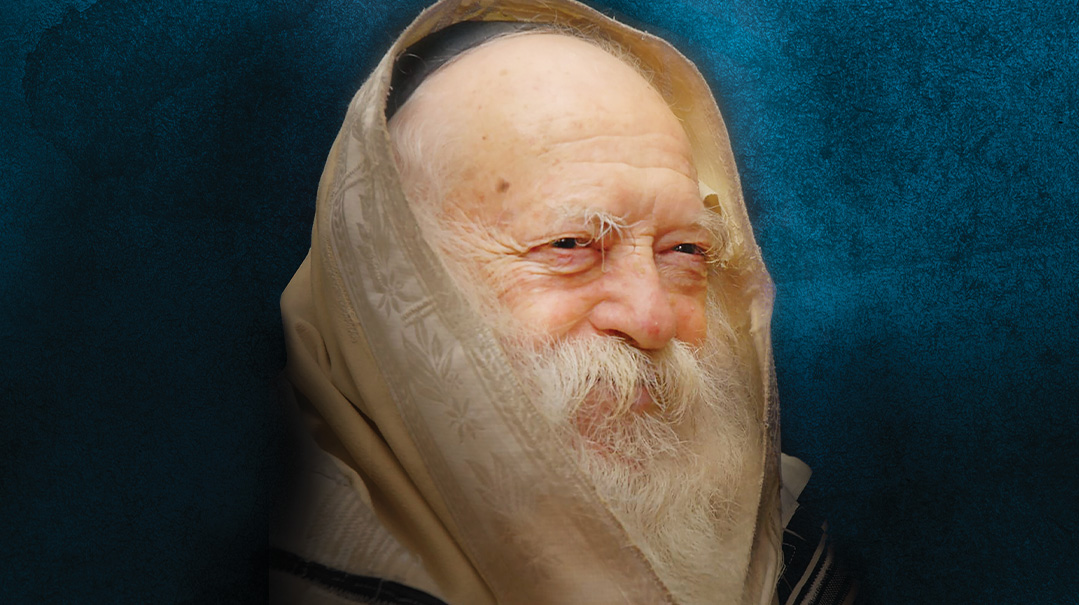
Photos: ArtScroll/Mesorah Publications, Mattisyahu Goldberg, Mishpacha archives
In the year since Rav Chaim Kanievsky’s petirah, it seems as if there is no end to the stories and lessons gleaned from the gadol hador, whose legendary, unsurpassed diligence was matched by his supreme kindness and caring. One talmid was determined not to let those stories get away, but to consolidate close family retrospections into one kaleidoscope of memories
The family had all just endured a week of mourning that would have sapped anyone’s strength. Masses of visitors — estimated at about half a million people over the course of the week — had flocked to Bnei Brak, hungering for insight into Rav Chaim Kanievsky’s life and character and eager to hear his children’s stories.
When the shivah was over, Klal Yisrael knew that the world was irrevocably changed, yet life went on and routine resumed. But there was one person who wasn’t willing to let the momentum slip away.
After Rav Chaim passed away last year on Motzaei Purim, leaving the Jewish world reeling with shock and grief, Rabbi Achi Cohen, a prominent educator in Israel who was part of Rav Chaim’s inner circle, immediately began working to preserve his legacy, tapping into his family’s memories to paint a vivid, intimate portrait of the gadol hador.
He spoke to all of Rav Chaim’s sons and sons-in-law, as well as three of his grandchildren, producing a collection of 11 videos featuring captivating interviews and priceless memories. In each segment, Rabbi Cohen gently asks a few probing questions, occasionally sharing a story of his own, and his interlocutor responds with a wealth of behind-the-scenes information and riveting stories.
These videos were recorded on the day after the shivah for Rav Chaim had ended, and there is palpable emotion in the air in every recording. The family members, sons and sons-in-law alike, speak with wistful longing. Some are quiet and introspective, while others are animated and passionate, but they all clearly wanted to share memories of their illustrious father and grandfather with Klal Yisrael.
Though only Rabbi Cohen and one family member can be seen in each video, it almost seems as if there’s another presence: The influence of Rav Chaim himself is keenly felt even in his absence. The family members hardly even invoke his name; while there is a sporadic mention of “the Rav” or “Rav Chaim,” they refer to him throughout most of the interviews with a mere pronoun. “He was holy from birth,” one son-in-law declares; “he was a living Shulchan Aruch,” another says. “He was a man of G-d, holy and a servant of Hashem since his youth,” a third son-in-law intones before bursting into tears.
With just one or two exceptions, the men met with Rabbi Cohen in their own homes, and most of them were filmed against backdrops of large bookcases lined with well-used seforim — apropos for any home associated with the Kanievsky family. Many also sat with closed seforim in front of them, as if just waiting to dive back into learning as soon as the interview ended — again, much like Rav Chaim himself.
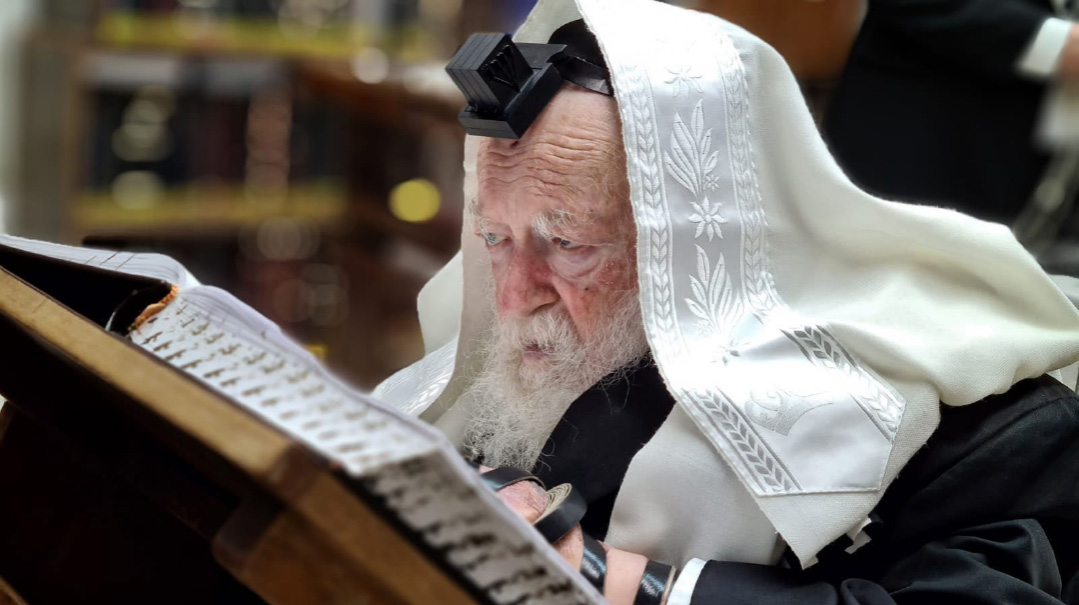
The family was reeling from the loss, but they wanted to talk. They wanted the world to know about Rav Chaim’s essence
The Tzaddik’s Power
Rabbi Achi Sholom Cohen, director of Mosdos Derech Emunah, was a close protégé of Rav Chaim Kanievsky. His close relationship with the gadol hador spanned the course of three decades. He made innumerable visits to Rechov Rashbam, seeking Rav Chaim’s input on every move he made, and taking care to carry out the Rav’s instructions to the letter.
A native of Bnei Brak, Rabbi Cohen first found his way into Rav Chaim’s graces as an unmarried yeshivah student, when he took the initiative to rescue a friend’s shidduch.
“I had a friend in yeshivah who came from a broken home and was very close to Rav Chaim,” Rabbi Cohen recalls. “After he got engaged, his kallah’s family learned some more information about his background and decided to call off the shidduch. I felt I could convince the family to patch things up, and I brought them all to Rav Chaim’s home to discuss the matter. That meeting clinched the family’s decision to renew the shidduch, and they made a l’chayim right there.
“After it was over,” Rabbi Cohen continues, “my friend turned to me and said, ‘I’m indebted to you. What can I do to repay you?’ I replied that I wanted a brachah for a shidduch, and when Rav Chaim overheard this, he said, ‘You will become a chassan within the month.’ Shortly thereafter, my shidduch was proposed, and my future mother-in-law asked Rebbetzin Kanievsky if she knew me. The Rebbetzin enthusiastically supported the idea, and that was how my marriage came about.”
Much of Rabbi Cohen’s life story is closely intertwined with his relationship with Rav Chaim, and he credits Rav Chaim with influencing many of the pivotal events of his life, often through the power of his brachos. For instance, he attributes the birth of his eldest child to a brachah from the tzaddik.
“On the first Chol Hamoed Succos after my marriage,” he remembers, “I visited Rav Chaim in his home and told him that I wanted a brachah for children. He instructed me to sit in a chair in his succah that had belonged to the Steipler and to recite three chapters of Tehillim. After I’d done this, he said, ‘Grow a beard, and I will be at the bris in another year.’ Sure enough, on the first day of Chol Hamoed on the following year, we celebrated the bris of my firstborn son.”
In another fateful turn of events, Rav Chaim’s blessing apparently sealed the shidduchim of two of Rabbi Cohen’s children just a couple of years ago.
“On Erev Yom Kippur,” Rabbi Cohen relates, “my second son was helping to organize the room for Rav Chaim’s minyan. Rav Chaim gave him a brachah to find his zivug within the year, but my son pointed out that his older brother was still unmarried. Rav Chaim then said, ‘Both of you will become chassanim this year.’ Sure enough, my oldest son became engaged the following summer, and my younger son celebrated his engagement on the following Erev Yom Kippur.”
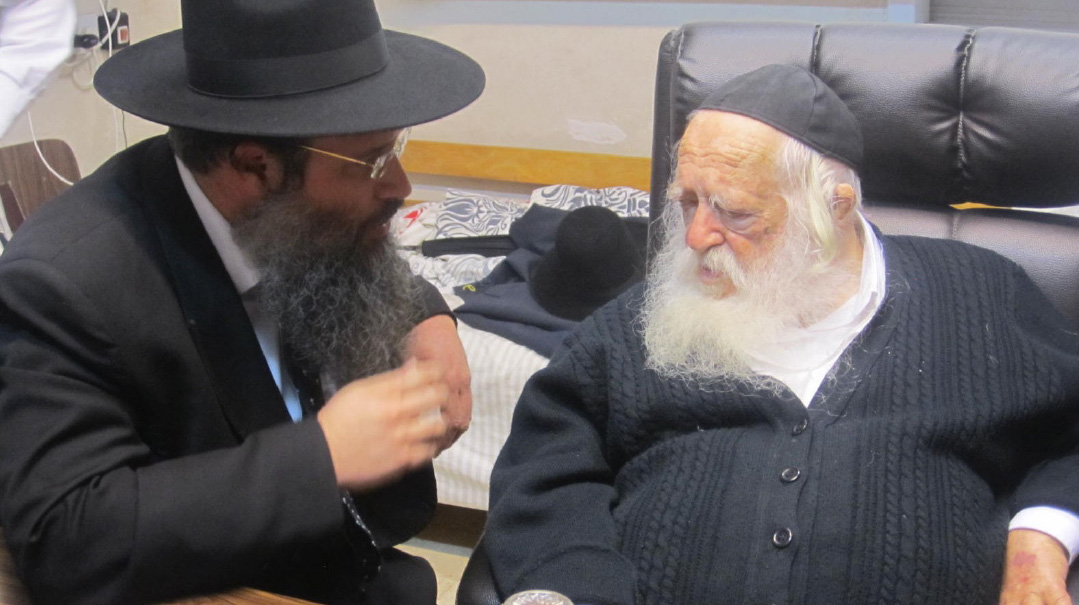
From the time Rabbi Achi Cohen first found his way to Rav Chaim as a bochur, his life had been closely intertwined with the gadol. Now his job was to keep the memories alive
Unanimous Agreement
When Rabbi Cohen asked Rav Chaim’s family to be interviewed on camera after the shivah, they enthusiastically agreed. “They were still reeling from the loss,” he says, “and they had just been through an exhausting week, but they wanted to talk. They wanted to share the Rav’s legacy with Klal Yisrael.”
Rav Chaim’s personal influence was clearly a factor in their decision, Rabbi Cohen adds. “Rav Chaim was an optimistic person by nature — he saw the good in everything. His family knew he wouldn’t have wanted them to be broken by his death, that he would have preferred for them to be upbeat and positive. This helped them put aside their grief to participate in these interviews.”
Two family members also commented that since the entire family was united in their agreement, it was likely a sign that Rav Chaim himself supported the initiative from his place in Shamayim.
“Some of them went to great lengths to participate in this project,” Rabbi Cohen adds. “I interviewed almost all of them on the first day after the shivah. From nine o’clock in the morning until midnight, I traveled from one home to another, sitting with each family member individually.
“One of Rav Chaim’s sons-in-law, Rav Zelig Braverman, was leaving for America that night. He told me to come to his home at ten o’clock in the evening, an hour before he needed to leave for the airport, and we spoke for almost the entire hour. Rav Dovid Epstein, rosh yeshivah of Yeshivas Torah B’Tifartah, was also extremely busy, but he insisted that he wanted to make time for me. They all wanted to share the kiddush Hashem of Rav Chaim’s life.”
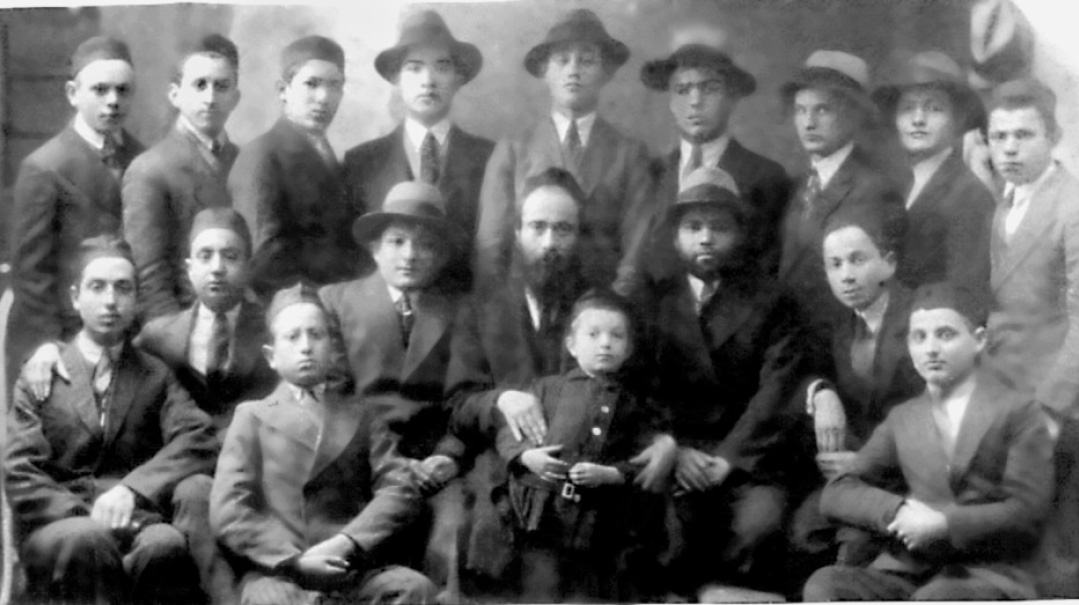
The seudas preidah for the Steipler — Rav Yaakov Yisrael Kanievsky — before he left Pinsk. The Steipler is seated in the center, with his young son Chaim standing in front
Close-Knit Bonds
Rabbi Cohen’s conversations with the family touched on numerous points, but there was one striking theme that emerged from many of their exchanges. While Rav Chaim was revered by all of Klal Yisrael as a veritable angel among men, he somehow came across to his family as an utterly normal, down-to-earth father.
“When his children were growing up,” Rabbi Cohen comments, “they felt that they were living in a home like any other. True, they saw many people coming to ask questions to their father, but they didn’t realize that it was such an extraordinary phenomenon. It took years for them to realize the magnitude of his greatness.”
Rav Shlomo Kanievsky, one of Rav Chaim’s sons, brought out this point powerfully in one of the recorded interviews. “My father was a sulam mutzav artzah v’rosho magia hashamaimah — a ladder resting on the earth and reaching the Heavens,” he asserted, borrowing the imagery from Yaakov Avinu’s famous dream.
“He demonstrated that it’s possible to be like any other human being while still rising to the loftiest heights. He ate two meals with his wife every day, he cared for his children and played with them, and he attended every family simchah. He was a devoted father and husband in every way. He did not engage in bizarre or outlandish practices such as slipping away from home to meditate for a week or fasting for days on end. He demonstrated to the world that it isn’t necessary to adopt extreme habits in order to be an adam gadol.”
Many of Rav Chaim’s other family members also spoke about his close involvement in his family’s lives. Rabbi Aryeh Kanievsky, one of Rav Chaim’s grandchildren, related in his interview that he began davening Maariv at Rav Chaim’s side on a daily basis when he was six years old. At the end of every tefillah, Rav Chaim handed him a tiny note for his father, in which he reported on his grandson’s behavior during davening.
Although Rav Chaim is sometimes perceived as a stoical scholar who was likely to have been aloof and uninvolved in his family’s lives, Reb Aryeh asserted that this wasn’t the case. It was only natural, he explained, that Rav Chaim was more closely acquainted with his older grandchildren, who were born when the family was smaller, but he made a point of inquiring after the well-being of any grandchildren he knew.
Similarly, Rav Zelig Braverman related that Rav Chaim endeavored to make conversation with him on a regular basis. On the whole, Rabbi Cohen explains, Rav Chaim strove to forge relationships with all of his children, as well as his sons-in-law. Although their conversations always revolved around Torah, this didn’t make their relationships distant or impersonal; on the contrary, every bond was warm and genuine.
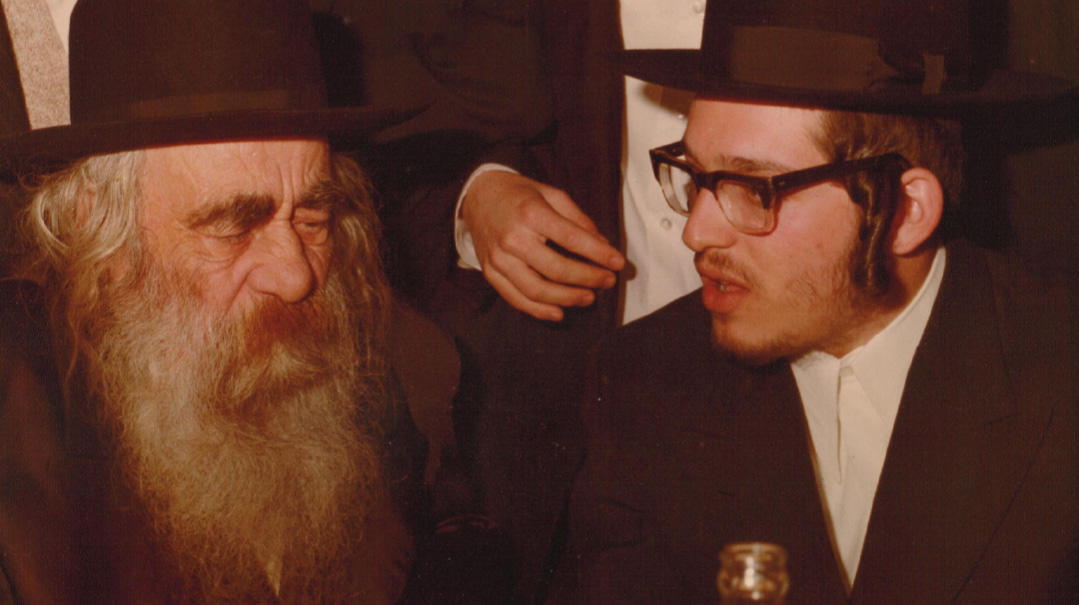
The Steipler with his grandson, Rav Chaim’s son. The Steipler reported how a generation before, when Rav Chaim himself was a young child, he had acquired a collection… of all the words in the Torah whose meaning he didn’t know
A Good Word for All
Rav Chaim’s patience and pleasant disposition also made for a running theme throughout the recordings. Rabbi Cohen himself attests that Rav Chaim made every effort to put others at ease in his presence. On that note, he shares an amusing story of his own.
“When my sons and I were invited for meals at Rav Chaim’s home, he would often ask me, as a Kohein, to lead the zimun and then to give him a Kohein’s brachah after the meal was over. One day, my sons were there without me, and Rav Chaim asked my eldest son for a brachah. My son was flustered and couldn’t figure out what to say. Finally, he blurted out, ‘Buha!’ This, of course, was Rav Chaim’s own trademark blessing to his visitors. Rav Chaim laughed heartily and exclaimed, ‘Amen!’ He was always in good cheer, and always put others at ease.”
Even in his earlier years, Rav Chaim was known to be mild-mannered and gentle. Rav Shlomo Kanievsky related that when Rav Chaim applied to the Lomza yeshivah in Petach Tikvah as a teenager, the administration was reluctant to accept him.
“There was another member of the family who had attended the yeshivah previously, and he had been a source of endless aggravation to them,” Rav Shlomo said. “He fought them on many issues, insisting on all sorts of stringencies pertaining to the use of electricity on Shabbos, hiddurim in kashrus, and other things. He eventually left the yeshivah, but when my father arrived, the administration was hesitant to deal with another member of our family.”
Of course, Rav Chaim was ultimately accepted to the yeshivah, and his experience there was radically different. But Rav Chaim wasn’t any less stringent or meticulous regarding halachic concerns. “My father accomplished everything that the other bochur had achieved, albeit without drawing attention to himself,” Rav Shlomo clarifies. Even at that young age, Rav Chaim had mastered the art of standing his ground without antagonizing those around him.
In his talk with Rabbi Cohen, son-in-law Rav Yitzchak Kolodetzky related that Rav Chaim would visit a different child on every night of Chanukah, and he always made sure to praise his children for the latkes they prepared. “He knew how to relate kindly to every individual and to say a good word to everyone,” Rav Kolodetzky said.
He added that Rav Chaim’s benevolence extended far beyond his own family, to the rest of Klal Yisrael as well. “He received letters from all over the world, and he responded to all of them. Even if the questions were inane or pointless, he would take the time to send his typical terse answers. The most important priority, as far as he was concerned, was for the questioners to feel good about themselves.”
Rav Kolodetzky was also awed by Rav Chaim’s reverent relationship with his parents. “Rav Chaim spoke to his father with the reverence some people have when picking up a lulav,” he related. “His sister, Rebbetzin Barzam, asserted that no one else in the world could compete with the honor that Rav Chaim showed to his mother. Even with his packed schedule, he always had plenty of time for the mitzvah of kibbud av v’eim.”
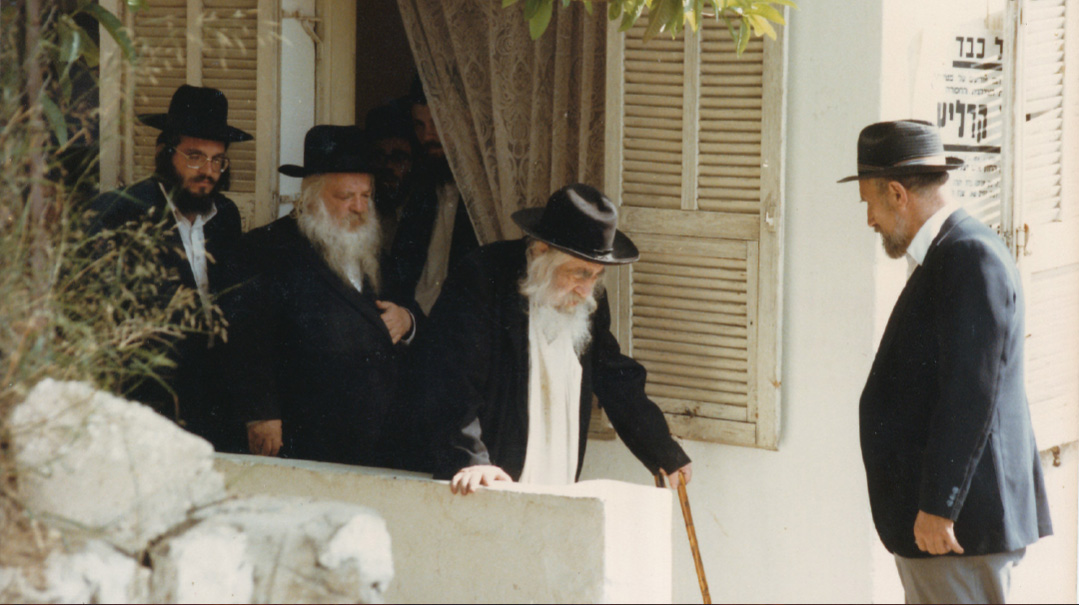
Three generations: the Steipler, Rav Chaim and his own son. The conversations always revolved around Torah, but the family bonds were unbreakable
Maximizing Every Moment
Even if it were possible to sketch a complete profile of Rav Chaim Kanievsky — and it’s hardly likely that mere words can ever do justice to such an extraordinary figure — it wouldn’t be complete without exploring how a human being managed to blossom into such a giant among men.
Rabbi Cohen points out that there is one particular thread that runs throughout the narrative woven by the family: Rav Chaim’s lifelong insistence on maximizing every single moment. In Rav Chaim’s life, not even a fraction of a second would ever go to waste.
Sitting in the same room where Rav Chaim himself spent many years plumbing the depths of the Talmudic sea, Rav Yitzchak Shaul Kanievsky quoted his father’s vivid depiction of the spiritual outcome of bittul Torah.
“Some people will arrive in Shamayim and be asked what they learned,” Rav Chaim used to say. “A person might say that he learned Bava Kamma, and he will be shown a huge masechta that is many times larger than the actual text. ‘What’s this?’ he’ll ask, and they will show him how he interrupted his learning after every line to make idle conversation. In Shamayim, all of those interruptions are recorded in the very same volume. My father used to say that he wanted his masechtos to be as thin as they were meant to be, with no excess chatter.”
Rav Braverman similarly highlighted the value that Rav Chaim attached to the use of his time. “He was unique in our generation in many ways,” he related, “but there was one thing in particular that was very striking: He never rested, even for a moment. Any other person will come home after any major exertion and sit down to a cup of coffee or at least take a few minutes to clear his mind, but he never did such a thing. There was never any interruption in his routine, and he had no concept of leisure time. The moment he walked through the door, he would take a sefer and dive into learning. And as soon as he closed one sefer, he would open another.”
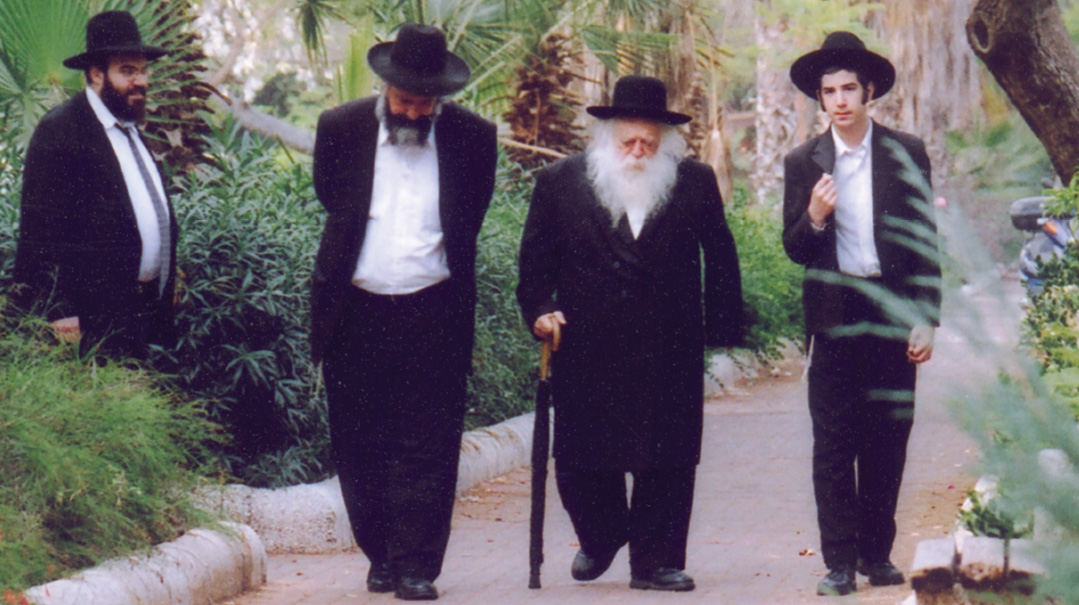
Limited Entry
Coupled with his insistence on saving time, was Rav Chaim’s diligent refusal to allow valuable space in his mind to be shared by any subject matter other than the Torah. Rav Shlomo Kanievsky commented that Rav Chaim davened three times every day for no outside knowledge to enter his mind — and clearly his prayers were accepted.
“When we learned the complicated sugyos of kiddush hachodesh together, he would make the most intricate calculations at lightning speed,” Rav Shlomo recalled. “I used a calculator, but he completed the calculations in his mind even faster. Nevertheless, when Israel switched its currency from lirot to shekels and it was necessary to make a simple conversion between the currencies, he wasn’t able to duplicate this feat, even on a much smaller level. He couldn’t make those calculations in his head, nor did he tolerate the change to daylight savings time. He also never remembered when he was invited to a bris — he had no room for any such information in his mind. But when a complex calculation was associated with Torah learning, it would take him a split second.”
Rav Gedaliah Honigsberg, one of Rav Chaim’s grandchildren, shared another story on a similar note: “Rav Reuvain Fain, the renowned rosh yeshivah of Torah Vodaath, was an avreich in Kollel Chazon Ish together with Rav Chaim. During a war, the thunderous sounds of explosions in Qalqilya were heard in the beis medrash in Bnei Brak. The other avreichim were unsettled, but Rav Chaim remained focused on his learning. Finally, someone said to him, ‘Rav Chaim, don’t you hear the booms? How can you carry on as if nothing is happening? Don’t you want to know what is going on there?’
“ ‘For us,’ Rav Chaim replied evenly, ‘the only nafka mina is whether a tank is mekabel tumah.’ He wasn’t even remotely interested in hearing about anything else,” Rabbi Honigsberg stressed.
In a similar vein, he added, a distinguished rav once visited Rav Chaim during the period when Egyptian president Anwar Sadat was threatening Israel with war. “Rebbi,” the visitor exclaimed, “they say that Sadat is going to destroy the entire country!”
Rav Chaim looked puzzled. “Sadat?” he repeated. “What is Sadat? I don’t know that word from anywhere in the Bavli or Yerushalmi.”
The visiting rav was deeply impressed. “If there is a Jew in Eretz Yisrael today who is so completely absorbed in Torah study that he doesn’t know who Sadat is,” he declared, “then in that merit, we will surely be saved.”
Rav Chaim endeavored to teach the same priorities to others as well. “People would come to him and say, ‘Rebbi, I can open yeshivos for baalei teshuvah,’ or ‘Rebbi, I can build a new city,’ but he would tell them all to sit and learn,” Rav Yehoshua Tzivyon related. “That was all that mattered to him. That was the sum total of what was important in his world.”
Available for the Taking
There were many more sides to Rav Chaim that emerged during the interviews as well: his incomparable scholarship, his consummate commitment to chesed, his painstaking adherence to even the tiniest detail of halachah, and much more. The videos were pared down to less than three hours of recorded exchanges, but even this material paints a powerful and compelling picture of a man whose true stature is probably beyond the scope of mortal comprehension.
Rabbi Cohen and the Kanievsky family agreed on one important point: While we might not reach Rav Chaim Kanievsky’s achievements, it’s still possible for every individual to learn something from his example. Rav Dovid Epstein, another one of Rav Chaim’s sons-in-law, pointed this out at the end of his interview. “When a tzaddik passes away, his virtues are hefker — they are all available for the taking, and everyone should grab whatever they can. There’s no need for any one person to take everything. One person can emulate his humility, another can seize his middos, and so forth. The important thing is to find some area in which to copy his example and to learn from his story.”
Without a doubt, that story will continue to be mined for inspiration and insights for many years to come.
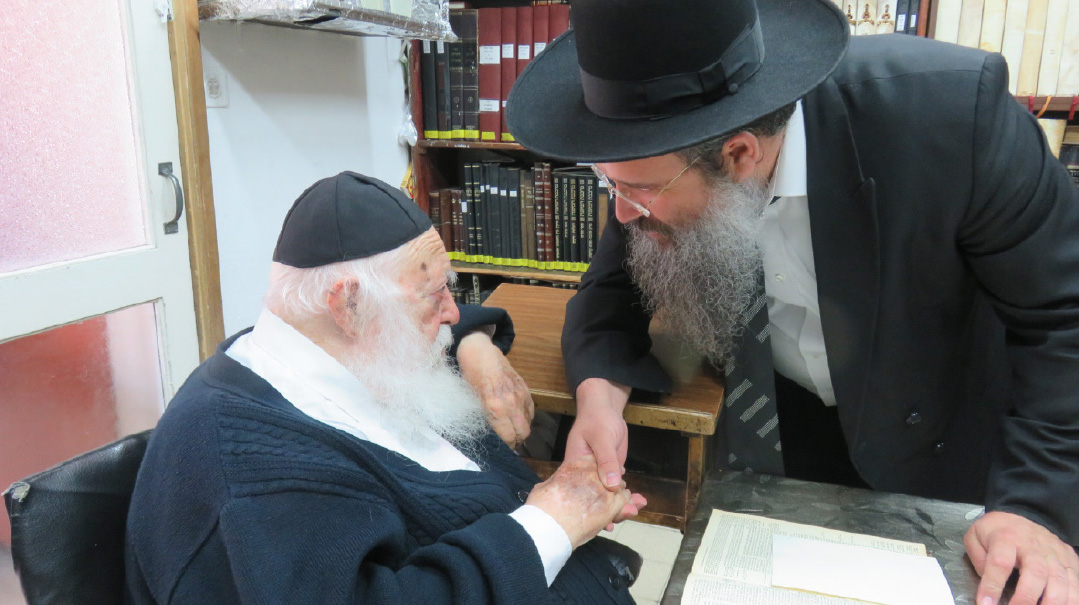
A Brighter Future
Rabbi Achi Sholom Cohen is the head of Mosdos Derech Emunah, a network of institutions founded 20 years ago with the guidance and encouragement of Rav Chaim Kanievsky. Derech Emunah began as a yeshivah for bochurim who had strayed from the path of Torah and were slipping away from the yeshivah world, offering guidance and support to the students and their family members. Rabbi Cohen has enjoyed exceptional success in helping these young men pull themselves back from the brink to build productive, fulfilling lives as fully observant Jews.
Experience has taught Rabbi Cohen and his colleagues that one of the most effective ways to influence these boys, is to pair every student with a kollel avreich who can serve as a “big brother” to the struggling young man. To that end, Derech Emunah today maintains a network of kollelim in various yeshivos in Yerushalayim, Beitar, and Bnei Brak, with over 100 avreichim who learn with the bochurim and work tirelessly to exert a positive influence on them. The avreichim of Derech Emunah spend their days immersed in the study of Torah and are all erudite scholars.
Rabbi Cohen himself provides expert guidance to his students, their parents, and the avreichim who learn with them. He also visits New York several times a year to provide direction to educators, parents, and bochurim, calling on his vast experience and the knowledge he has gained from his many interactions with gedolei Yisrael to offer sage and effective advice.
Rabbi Cohen is heavily involved in perpetuating Rav Chaim’s memory and legacy. Three months after Rav Chaim’s passing, Rabbi Cohen oversaw a hachnassas sefer Torah at Rav Chaim’s home; the new sefer Torah will be used in Rav Chaim’s regular minyan, which has continued to meet in his apartment even after his death.
Mosdos Derech Emunah was recently granted an allocation of land for a new shul in Ramat Beit Shemesh. This will be the first shul to bear Rav Chaim Kanievsky’s name.
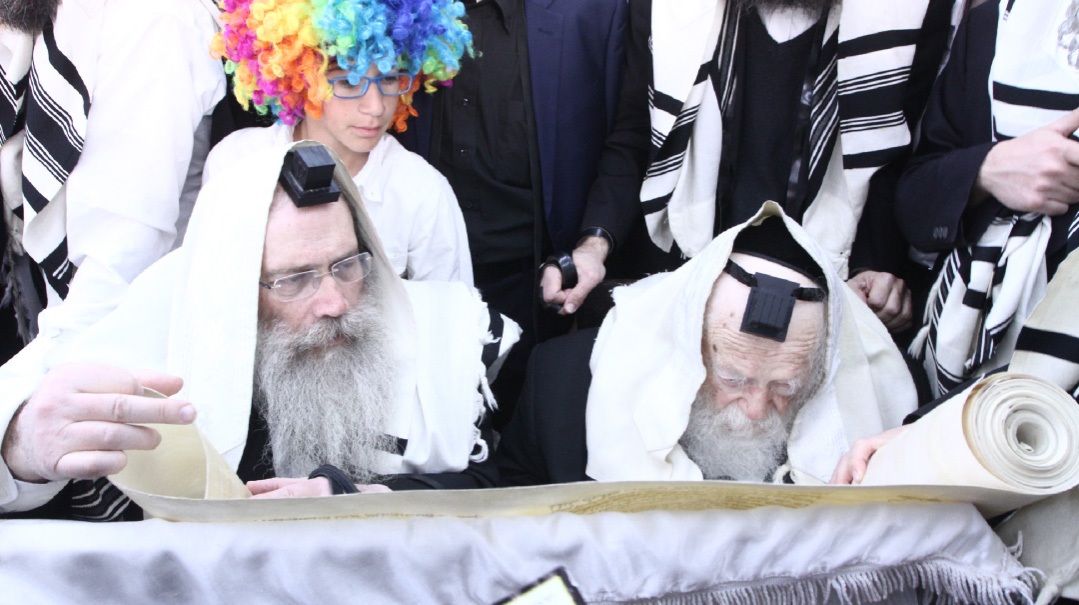
“A Living Shulchan Aruch”
Rav Shraga Steinman
Rav Shraga Steinman is the nexus between two of the most illustrious families of our generation: He’s the son of Rav Aharon Yehuda Leib Steinman and the son-in-law of Rav Chaim Kanievsky, having been married to Rav Chaim’s late daughter, Rebbetzin Chana. In his conversation with Rabbi Achi Cohen, he was calm and reserved, but one could sense the awe with which he spoke about his late father-in-law, waxing enthusiastic in his own quiet way about Rav Chaim’s piety and erudition.
“He was a living Shulchan Aruch,” he declared. “He sat in his corner and wasn’t involved in communal affairs, but he radiated Torah to the entire world. He infused our world with the spirit of hasmadah, inspiring people to learn more masechtos, more Bavli, more Yerushalmi…. Today, every child aspires to learn Shas, and much of that is because of him. He created these aspirations.”
Rav Steinman remembered one particular incident that showcased Rav Chaim’s unfathomably vast knowledge: A certain darshan in Bnei Brak was once trying to find the source of an idea but couldn’t trace its origin. He was certain that he had seen it in the Midrash, but when he presented his question to Rav Chaim, the gadol thought for a moment and then replied, “It’s not in the Midrash. It’s in the Abarbanel’s commentary on the Haggadah, on the piyut of Vayehi Bachatzi Halailah.”
“Who in the world is capable of instantly remembering such obscure sources?” Rav Steinman said in wonder.
My Father, The Gadol
Rav Avraham Yeshaya Kanievsky
Rav Avrohom Yeshaya Kanievsky met with Rabbi Cohen in a room in his home that doubles as a shul and beis medrash, with a bimah and a row of shtenders clearly visible behind him. He spoke softly and gave fairly terse responses. The recent loss clearly still weighed on him, but at the same time, his dominant emotion seemed to be a deep, abiding sense of respect for his father.
He began by describing Rav Chaim’s exceptional dedication to his children, in a tone that bespoke wonder and awe. “He invested an enormous amount of energy in us,” Rav Avraham Yeshaya said. “He learned everything with his children: the entire Chumash in order, the Neviim Rishonim, the entire Mishnah, and then Shas. Every child made a siyum on Shas around the time of his bar mitzvah.
“And he learned with every child in accordance with his needs. He would instruct a child to learn the Gemara and then to explain it, or to look in Rashi and explain it, and he would wait patiently while we tried to figure it out. Sometimes he would even sit and wait for an hour or two while we worked on it.” Rabbi Cohen drew in his breath in astonishment at that particular detail.
One of Rav Chaim’s salient traits was his relentless consistency, and Rav Avraham Yeshaya revealed that this meant that every single day of the year was exactly the same for him. His rigorous learning schedule was not altered even on the busiest days of the year, and while he performed every seasonal mitzvah in its time, nothing was ever allowed to disrupt his routine. “Every day was the same,” Rav Avraham Yeshaya asserted. “Whether it was Purim or Yom Kippur, it was all the same to him. He simply continued his regular routine every day, never allowing anything to interfere with his schedule.”
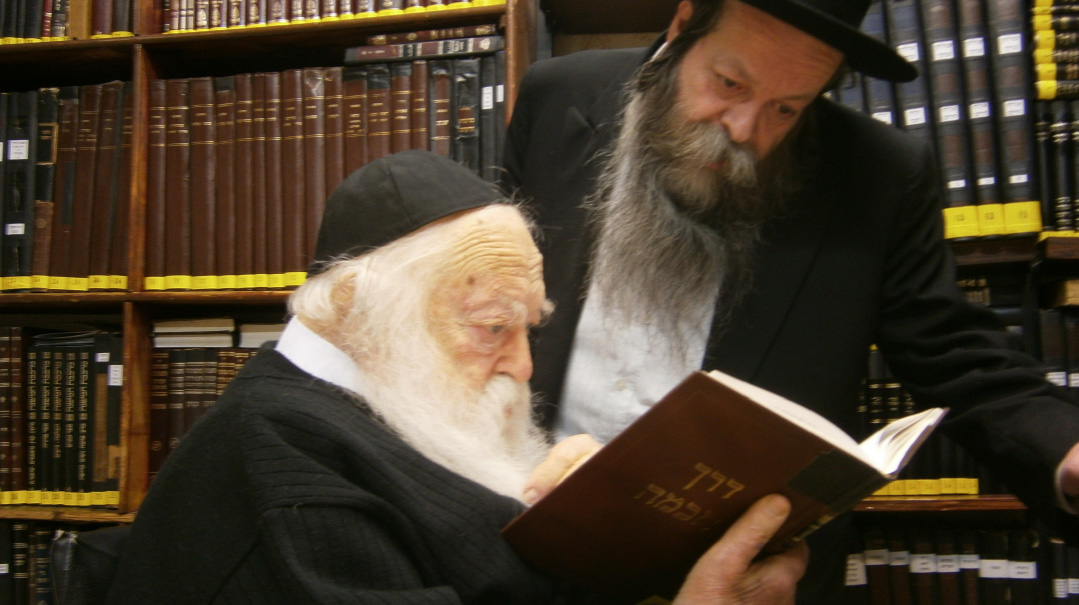
Guiding Them Higher
Rav Shlomo Kanievsky
Rav Shlomo Kanievsky sat in a high-backed chair at the head of his dining room table, gently shuckeling back and forth as the conversation with Rabbi Cohen progressed. Rav Shlomo is himself a rosh yeshivah of renown, and he remarked that although Rav Chaim wasn’t personally involved in running yeshivos or kollelim, he occasionally offered insights that opened a fresh perspective on the subject.
“When my yeshivah was first opened, we founded a kollel to accompany it,” Rav Shlomo said. “The kollel had its own set of rules and expectations for the avreichim. We offered a fixed salary and explained that anyone who did not keep the rules would be docked accordingly. When I later mentioned this to my father, he told me I had made a mistake. ‘Instead of setting a base salary and penalizing anyone who doesn’t keep the rules,’ he said, ‘you should have set a base salary and then added to the payments for anyone who did keep the rules.’ ”
Maximum Investment
Rav Yitzchak Shaul Kanievsky
Rav Yitzchak Shaul Kanievsky met with Rabbi Cohen in the very same room where his father spent countless hours every day poring over his seforim. He chuckled when Rabbi Cohen greeted him as the “mara d’asra,” explaining that Rav Chaim had always asserted that Rav Yitzchak Shaul was the true master of his household.
Although Rav Chaim’s profound devotion to his children was noted by several family members as a prominent element of his personality, Rav Chaim himself did not view it as exceptional in any way. “It never occurred to my father that he was different from anyone else in the world,” Rav Yitzchak Shaul revealed, “but he invested time and effort in his children to a degree that was beyond normal. He learned with all of his children for a significant amount of time every day, giving them as much time as it took to ensure their full comprehension of the material.”
The average parent would probably lack the time or patience to painstakingly cultivate his children’s knowledge in this way, but Rav Chaim viewed his children’s chinuch like any other mitzvah — a duty that required him to make the maximum possible investment of time and effort.
Rav Yitzchak Shaul pointed out another unique aspect of Rav Chaim’s parenting style: Even when his children were young and the family lived in close quarters, Rav Chaim was capable of completely tuning out any disturbances in his vicinity without burdening his family members with the need to maintain silence.
“As soon as he decided that he was learning, he didn’t hear a thing,” the younger Rav Kanievsky recalled. “He didn’t need to chase us out of the room. He simply didn’t hear us at all.”
One can hardly imagine the average father tolerating his children making noise while he tries to concentrate on learning for hours on end, day after day — but Rav Chaim Kanievsky, of course, was far from the average father.
Undeterred Devotion
Rav Yitzchak Kolodetzky
Rav Yitzchok Kolodetzky sat at a small table, swaying back and forth with great emotion as he shared his recollections. While many of the other family members spoke somberly, he was animated and energetic, as if the mere thought of paying tribute to Rav Chaim somehow generated an electric surge of passion within him.
One year on Succos, he related, it was raining heavily and no one in Bnei Brak was sitting in a succah — that is, no one except Rav Chaim. Although the inclement weather conditions made it impossible to fulfill the mitzvah, Rav Chaim identified a minority view in the Rishonim that he would be able to satisfy.
“Rabbeinu Tam maintains that if a sheet is placed within three tefachim of the sechach, it doesn’t invalidate the sechach,” Rav Kolodetzky explained. “Rav Chaim therefore came up with a novel idea: He stretched a plastic tablecloth across the top of the succah, hanging it within three tefachim of the sechach so that it would be considered subordinate to the sechach, and left it there to catch the rainwater while he sat beneath it.”
Rav Kolodetzky emphasized that the accepted halachah doesn’t follow Rabbeinu Tam’s opinion, but this this wasn’t a deterrent to Rav Chaim’s devotion. If there was a way for him to fulfill a mitzvah, even according to the view of a single Rishon, nothing would stop him from carrying it out.
Rav Chaim’s no-compromise approach to halachah was also illustrated in another memorable incident. “One Shabbos morning, we heard a knock at our door,” Rav Kolodetzky related. “We knew right away that it was Rav Chaim, because he had a very distinct knock. There is one view in the Rishonim that a person is required to use his fingers rather than his fist to knock on a door on Shabbos, and Rav Chaim always took that position into account.
“However,” he added, “it was very unusual for Rav Chaim to show up on Shabbos at all. Many of his famous chovos were scheduled on Shabbos, and he generally had no time for visiting. On that Shabbos, he wanted to know if we had any extra cholent. He explained that the gas in his apartment had gone out and the cholent had grown cold. ‘The Rema says that anyone who does not eat hot food on Shabbos is considered like a tzeduki,’ he said.”
Rav Kolodetzky questioned the urgency of Rav Chaim’s visit. “I pointed out that the Rema is referring to a person who intentionally forgoes hot food on Shabbos,” he related. Since Rav Chaim had a cholent of his own prepared, and it had cooled off through no fault of his own, his son-in-law doubted that the Rema’s condemnation would apply.
“You are right,” Rav Chaim replied, “but I still don’t want to be associated with that class of people.”
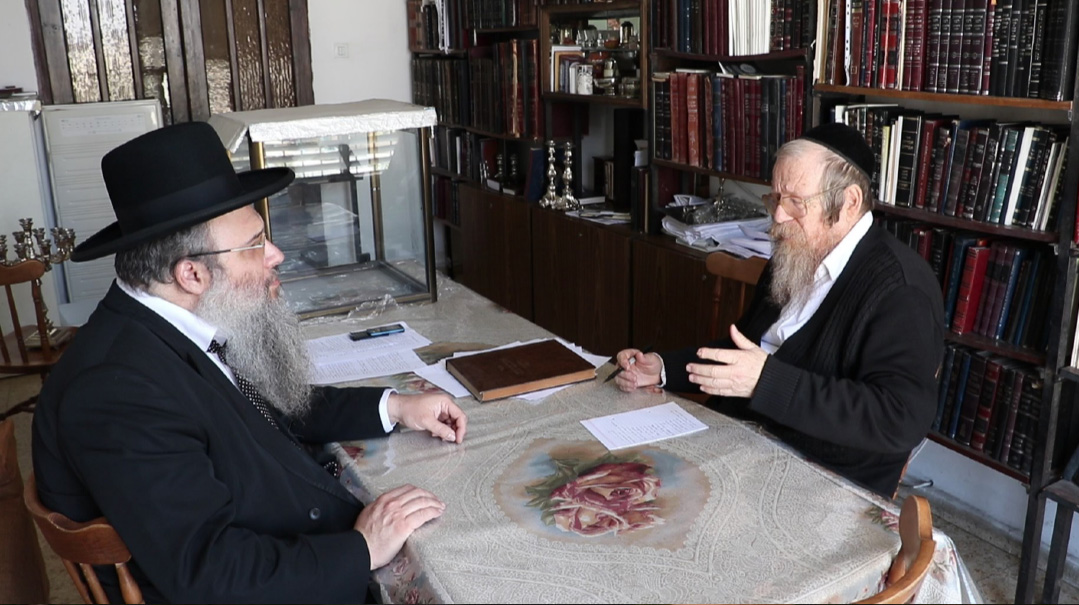
Unfathomable Numbers
Rav Yehoshua Tzivyon
Rav Yehoshua Tzivyon was perhaps the most emotional of all the family members during his interview, breaking down in tears at one point in the conversation.
“Rav Chaim learned about ten million pages of Gemara over his lifetime,” he revealed. “At the age of 16, he began his incredibly demanding routine of learning the entire Torah — the Bavli and Yerushalmi, the Tosefta and Mechilta, the Rambam and the Zohar, and all the Midrashim. Forty years ago, he revealed that he had learned Maseches Kiddushin more than 100 times.
“It’s estimated that a million people passed through his home, and that he tested 100,000 children on their learning and wrote 300,000 letters in response to the multitude of questions he received. Who in the world can accomplish so much?”
Another Sphere of Existence
Rav Zelig Braverman
“Rav Chaim’s first word was ‘Berachos’ — not ‘Abba’ or ‘Ima’ but the title of the first tractate in Shas,” Rav Zelig Braverman shared, quoting a story that was passed down from the Steipler himself. “He was born holy. Every child collects things, but do you know what Rav Chaim collected? At the age of six or seven, he made a ‘collection’ of all the words in the Torah whose meaning he didn’t know. Knowledge of the Torah was the only thing that ever interested him.”
Rav Braverman viewed Rav Chaim as inhabiting a completely different sphere of existence. “His reality was governed by an entirely different set of rules. A person once came to Rav Chaim and told him that his grandson was very ill. Rav Chaim gave the man a ‘prescription,’ but it had nothing to do with medication: He simply wrote that he should learn the Yerushalmi on Nazir and the child would be healthy.”
Rav Braverman asserted that Rav Chaim’s knowledge of the Torah wasn’t just quantitatively different from that of anyone else; it actually differed on a qualitative level. “Many talmidei chachamim know the Talmud Bavli and some great scholars know the Talmud Yerushalmi as well,” he said. “If they are even greater, they also know the Midrash. But Rav Chaim mastered all of these sources in a different way. He didn’t just know the Bavli and the Yerushalmi and the Midrash — the entire Torah was a single, vastly interconnected unit in his mind, and he perceived it as one organic entity.
“He had the ability to derive conclusions regarding the halachic borders of Eretz Yisrael from the Midrash Rabbah. Although Rav Elyashiv maintained that we cannot derive halachah from the Midrash, Rav Chaim disagreed with him. He was able to find sources on every subject in the parts of the Torah that were seemingly the least relevant to it.
“If you learn his seforim, you will find that on every other page he quotes a Yerushalmi or some other source that seems completely unrelated to the topic at hand, but he manages to find a brilliant link between the subjects. He took it as a foregone conclusion that everything in the Torah connects to everything else.
“The Ruach Chaim states that a person can use the halachos of succah to determine how to permit an agunah to remarry. Many people were unable to figure out where such a connection exists, but Rav Chaim was able to explain it: The Gemara in Bava Basra derives the halachos of a get mekushar, a certain type of document that might be used for a divorce, from laws pertaining to a succah.”
Interestingly, Rav Braverman added that Rav Chaim, unlike many other Torah scholars, did not express consternation when he came across a question that he couldn’t resolve.
“People are sometimes unable to sleep after hearing a certain kushya,” Rav Braverman said. “Such things didn’t bother Rav Chaim. His burning passion in life was to master the knowledge of the entire Torah, and when he encountered a kushya, it didn’t represent a flaw in his knowledge.”
Halachah as Reality
Rav Dovid Epstein
Rav Dovid Epstein’s calm, even tone as he spoke with Rabbi Cohen belied his busy schedule as one of the roshei yeshivah of Torah B’Tifartah, a yeshivah with a student body of about 1,000 bochurim. He described some extraordinary experiences without batting an eyelash.
During the bein hazmanim vacations, Rav Chaim generally visited his daughter and son-in-law, Rav Dovid and Rebbetzin Dina Epstein, in their Bnei Brak home, which was only a short distance from his own, in order to escape the crowds who tended to descend on his own home. One Friday during such a vacation period, after Rav Epstein and his wife left their home to travel to Yerushalayim for Shabbos, Rav Chaim returned to their apartment and found the door locked. Realizing that he had forgotten his key, he began knocking on the door, but there was no response. The neighbors noticed the elderly gadol standing outside the apartment, and someone even offered to break down the door. Rav Chaim declined the offer and eventually returned to his own home.
When Rav Chaim saw his daughter and son-in-law again after Shabbos, he told them that the experience had been a Divinely decreed punishment, since he often locked the front door of his own apartment while learning in his side room, where he was unable to hear visitors.
“This was a message from Shamayim that I was wrong,” Rav Chaim asserted. “They were telling me, ‘See, you can knock and knock but no one will listen to you.’ ” This triggered a change in Rav Chaim’s personal policy, and he began leaving his front door open for the benefit of the public.
Rav Epstein shared another story that took place on the day after the funeral of Rav Chaim’s mother-in-law, Rebbetzin Elyashiv. Never one to delay a mitzvah, Rav Chaim took the first opportunity after her passing to travel to Yerushalayim along with Rav Epstein to visit his father-in-law who was sitting shivah.
When they arrived, an avreich spotted Rav Chaim on the street and approached him. “Please, Rebbi,” he said, “I have been married for ten years; may I have a brachah for a child?”
Rav Chaim asked the man for his name and spoke to him briefly, and it soon became clear that the avreich had been blessed with a daughter three years earlier and was now seeking a brachah for another child. Rav Chaim looked at him in astonishment and exclaimed, “You have a daughter? How is it possible that I don’t know that?”
After the man had gone on his way, Rav Chaim remarked to his son-in-law, “I don’t know this man, but I have been davening for him for the past ten years, three times a day. He clearly gave me his name in the past. Why didn’t he come to tell me when his daughter was born?”
Another striking incident occurred one year on the night of bedikas chometz. Rav Epstein and his wife arrived at Rav Chaim’s home late at night, when he was finishing the bedikah, and found the Rav somewhat anxious.
“Someone came to speak to me earlier,” Rav Chaim told them, “but I was unable to answer him because I was still in the middle of the bedikah. I’m concerned that I might have offended him, and I would like to apologize.”
Rav Chaim knew only the man’s name, and while he managed somehow to find out where he lived, he didn’t know the exact address. Undeterred, Rav Chaim set out on a trek across Bnei Brak, accompanied by his daughter and son-in-law. Upon arriving at the correct street, they searched every building for the visitor’s family name until they finally located his door. Rebbetzin Epstein climbed the stairs to inform the surprised man that Rav Chaim Kanievsky was waiting at the entrance of his building to speak to him. Naturally, the man accepted Rav Chaim’s apology, and the Rav’s fears were allayed.
Perhaps the most astonishing story Rav Epstein shared is what happened the day of Rebbetzin Batsheva Kanievsky’s passing, on Shabbos of Chol Hamoed Succos. After she collapsed, Rav Chaim sat in his succah learning Choshen Mishpat while the paramedics attempted to resuscitate his wife. Eventually, a doctor entered the succah to inform him that the Rebbetzin had passed away.
Rav Chaim’s only reaction was to close the sefer he was learning and take out another volume of the Shulchan Aruch, in which he began studying the laws of aveilus. Since the halachah prohibits weeping on Shabbos, he didn’t allow himself to shed a tear. It was only after Shabbos had ended that he began to weep copiously over his loss.
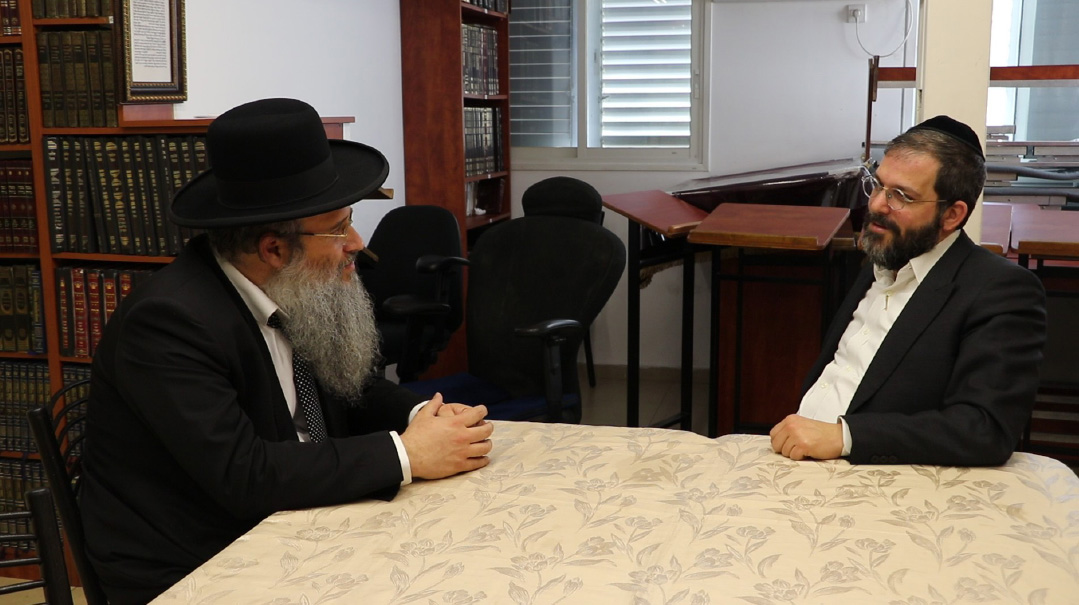
Open Doors
Rabbi Aryeh Kanievsky
“My grandfather was once hospitalized in Mayanei HaYeshua,” related Reb Aryeh Kanievsky, the son of Rav Avraham Yeshaya Kanievsky, sitting in the same room where his father had been interviewed. “When the hospital decided to discharge him, he was still very feeble, and his doctor insisted that he shouldn’t continue receiving visitors. He was so weak, they said, that it could actually endanger his life to continue dealing with the crowds.”
Nevertheless, Rav Chaim refused to close his doors to the public, pointing out that the chesed of receiving the public might have been the source of his Torah knowledge. The only change he would tolerate was to organize the process and restrict visiting hours to set hours of the day, in order to relieve some of the burden it created for him. But Reb Aryeh recalled that he remained as solicitous as ever.
“He would always send me outside after his hours to make sure there was no one still waiting to see him. And if there was anyone there, he would insist that I bring the person in.”
Reb Aryeh also made note of Rav Chaim’s famous habit of advising his visitors to undertake kabbalos in conjunction with his blessings. He recalled that a man who was very ill once came to Rav Chaim to ask for a brachah. Rav Chaim advised his visitor to grow a beard, but the man was reluctant to do so.
Two weeks later, the same visitor returned, still clean shaven, and begged for another brachah, explaining that he had found it too difficult to comply with the Rav’s suggestion. Rav Chaim agreed to give him a brachah, but he later expressed his frustration to his grandson.
“I simply don’t understand people,” Rav Chaim said. “Look at the power of the yetzer hara! This man wants to recover. This is something that he wants for himself, not for me, yet he refuses to accept my advice. It is amazing,” the gadol hador added, “that people are even willing to die rather than make such simple changes in their lives.”
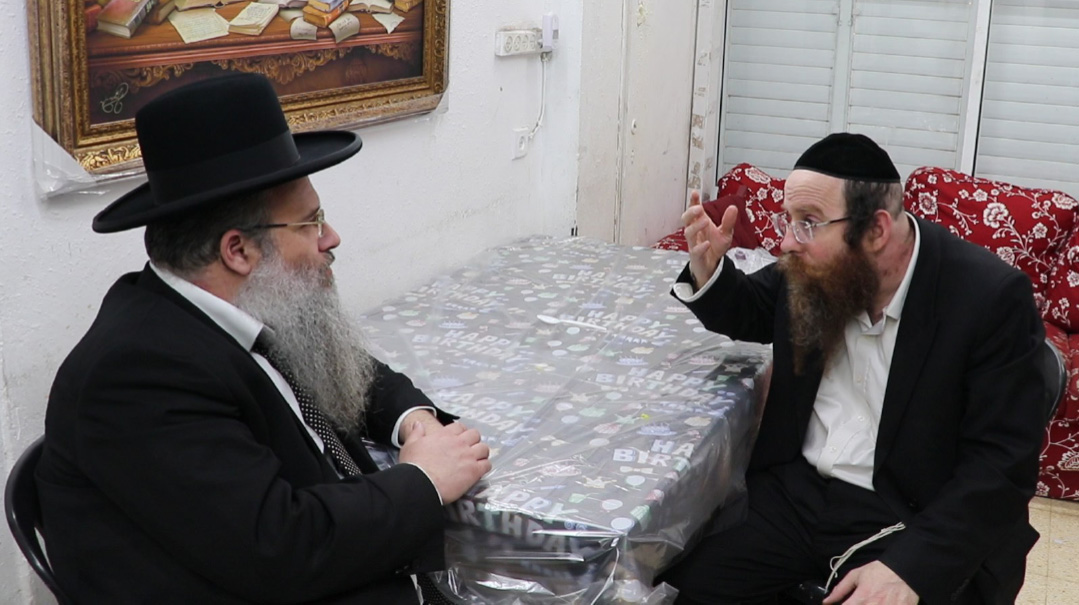
Man of Truth
Rav Gedaliah Honigsberg
Rav Gedaliah Honigsberg is married to one of Rav Chaim’s granddaughters and developed a very close relationship with the Rav. Rav Gedaliah spoke animatedly about several aspects of Rav Chaim’s inimitable personality. “The Rebbetzin used to say that he was a living sefer Torah,” he declared passionately. “Every day throughout his life, we discovered new things about the Rav that amazed and inspired us.”
Rav Gedaliah’s entire being seemed to vibrate with enthusiasm as he spoke about Rav Chaim’s absolute disregard for anything that wasn’t relevant to the Torah. “The grandson of a certain rosh yeshivah once conducted a siyum in Rav Chaim’s home,” he said. “Later that day, the rosh yeshivah spoke to Rav Chaim and mentioned that the president of the United States had visited Israel that day. Rav Chaim replied, ‘I don’t know anything about that. All I know is that your grandson made a siyum here.’ The visits of famous world leaders were meaningless to him, but when a young man performed a siyum, that was a significant event.”
Rav Honigsberg added that Rav Chaim used to urge others to dedicate time to learning Torah as well, sometimes even to the dismay of his listeners. A wealthy philanthropist who supported many Torah institutions once came to visit Rav Chaim along with a group of roshei yeshivah who benefited from his patronage. After the roshei yeshivah introduced the guest and praised him for his regular donations, Rav Chaim peered at the man and asked, “Do you make time to learn for yourself?”
The visitor confessed that he didn’t personally engage in Torah study. “That isn’t right. You should be learning as well!” Rav Chaim reproached him.
The roshei yeshivah walked out of that meeting in a panic, fearing that their prized donor might have been offended enough to withdraw his support for their institutions. However, those fears were soon put to rest. A few weeks later, Rav Chaim received a letter of thanks from the philanthropist, in which he wrote: “I met you a while ago, and my visit to you was the highlight of my trip to Israel. I enjoyed meeting you because you are a man of truth, and you did not hesitate to tell me what I needed to do. Thanks to you, I have hired a talmid chacham to learn with me for two hours a day.”
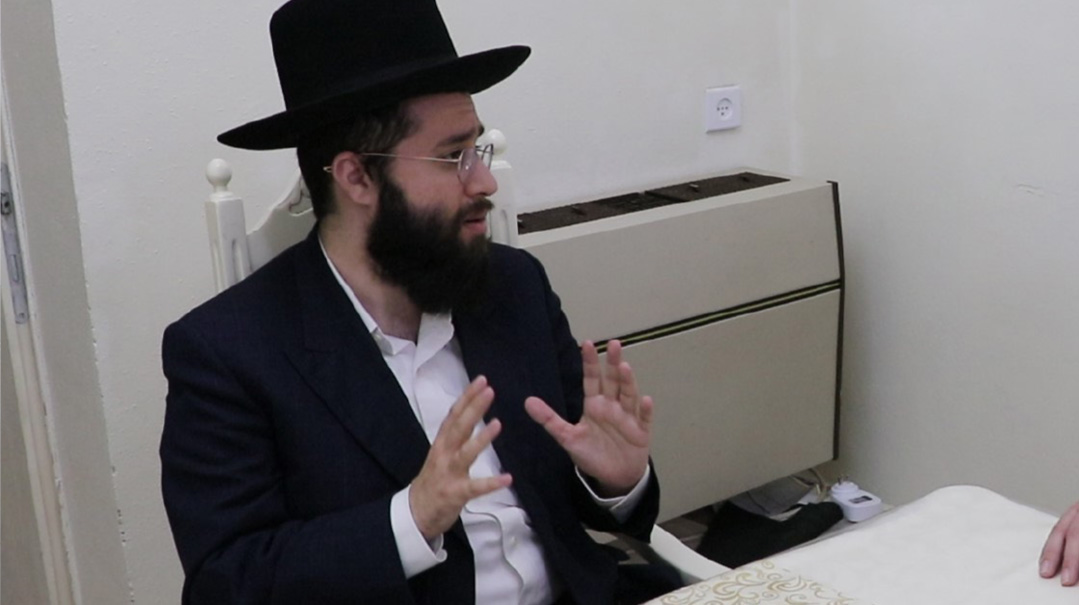
Close-Range Observations
Rabbi Yaakov Yisroel Kanievsky
The last family member to appear in the series of interviews was Rabbi Yaakov Yisroel (“Yanky”) Kanievsky. Reb Yanky, Rav Chaim’s grandson, was perpetually at the Rav’s side, attending to his grandfather’s needs and helping him handle his visitors. In his talk with Rabbi Cohen, he shared his perception of Rav Chaim’s attitude toward the people who flocked to his home.
“The Rav didn’t present himself as the leader of the generation when he received visitors,” he said. “He acted like a simple person whose only interest was in doing chesed for his fellow Jews. He would sit at the table to talk to a person from Afula who came to discuss his shalom bayis problems and a person from Kiryat Sefer who came to discuss a problem with his child, and he gave each of them the same attention.”
Reb Yanky also observed that Rav Chaim epitomized the ideal of zerizus; when he felt that something needed to be done, he wouldn’t tolerate delay. “A certain avreich was once visiting,” he recalled, “and the Rav asked him to deposit a couple of letters in the mailbox on his way out. The avreich agreed to do it, but as he was leaving the house, someone asked him to help fix a broken fan. He placed the letters on a nearby table while he provided that assistance, and a few minutes later, he came back to the table and saw that the letters were no longer there.
“He looked around in confusion until he spotted the Rav himself laboriously climbing the stairs. ‘You didn’t mail the letters right away, so I decided to do it for you,’ Rav Chaim said simply as he reentered the apartment.”
(Originally featured in Mishpacha, Issue 950)
Oops! We could not locate your form.







